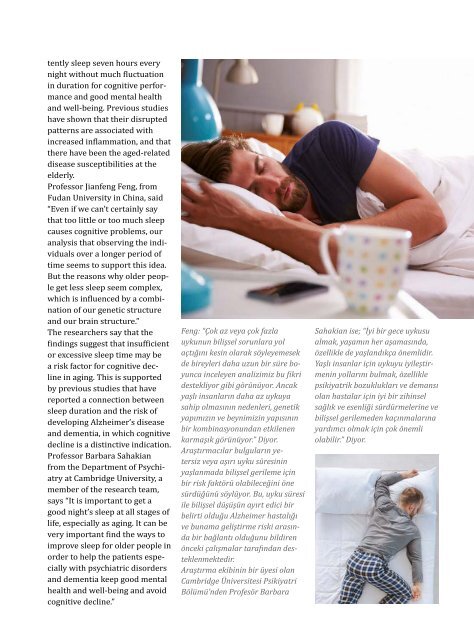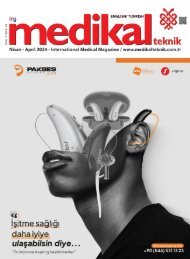Create successful ePaper yourself
Turn your PDF publications into a flip-book with our unique Google optimized e-Paper software.
tently sleep seven hours every<br />
night without much fluctuation<br />
in duration for cognitive performance<br />
and good mental health<br />
and well-being. Previous studies<br />
have shown that their disrupted<br />
patterns are associated with<br />
increased inflammation, and that<br />
there have been the aged-related<br />
disease susceptibilities at the<br />
elderly.<br />
Professor Jianfeng Feng, from<br />
Fudan University in China, said<br />
“Even if we can’t certainly say<br />
that too little or too much sleep<br />
causes cognitive problems, our<br />
analysis that observing the individuals<br />
over a longer period of<br />
time seems to support this idea.<br />
But the reasons why older people<br />
get less sleep seem complex,<br />
which is influenced by a combination<br />
of our genetic structure<br />
and our brain structure.”<br />
The researchers say that the<br />
findings suggest that insufficient<br />
or excessive sleep time may be<br />
a risk factor for cognitive decline<br />
in aging. This is supported<br />
by previous studies that have<br />
reported a connection between<br />
sleep duration and the risk of<br />
developing Alzheimer’s disease<br />
and dementia, in which cognitive<br />
decline is a distinctive indication.<br />
Professor Barbara Sahakian<br />
from the Department of Psychiatry<br />
at Cambridge University, a<br />
member of the research team,<br />
says “It is important to get a<br />
good night’s sleep at all stages of<br />
life, especially as aging. It can be<br />
very important find the ways to<br />
improve sleep for older people in<br />
order to help the patients especially<br />
with psychiatric disorders<br />
and dementia keep good mental<br />
health and well-being and avoid<br />
cognitive decline.”<br />
Feng: “Çok az veya çok fazla<br />
uykunun bilişsel sorunlara yol<br />
açtığını kesin olarak söyleyemesek<br />
de bireyleri daha uzun bir süre boyunca<br />
inceleyen analizimiz bu fikri<br />
destekliyor gibi görünüyor. Ancak<br />
yaşlı insanların daha az uykuya<br />
sahip olmasının nedenleri, genetik<br />
yapımızın ve beynimizin yapısının<br />
bir kombinasyonundan etkilenen<br />
karmaşık görünüyor.” Diyor.<br />
Araştırmacılar bulguların yetersiz<br />
veya aşırı uyku süresinin<br />
yaşlanmada bilişsel gerileme için<br />
bir risk faktörü olabileceğini öne<br />
sürdüğünü söylüyor. Bu, uyku süresi<br />
ile bilişsel düşüşün ayırt edici bir<br />
belirti olduğu Alzheimer hastalığı<br />
ve bunama geliştirme riski arasında<br />
bir bağlantı olduğunu bildiren<br />
önceki çalışmalar tarafından desteklenmektedir.<br />
Araştırma ekibinin bir üyesi olan<br />
Cambridge Üniversitesi Psikiyatri<br />
Bölümü’nden Profesör Barbara<br />
Sahakian ise; “İyi bir gece uykusu<br />
almak, yaşamın her aşamasında,<br />
özellikle de yaşlandıkça önemlidir.<br />
Yaşlı insanlar için uykuyu iyileştirmenin<br />
yollarını bulmak, özellikle<br />
psikiyatrik bozuklukları ve demansı<br />
olan hastalar için iyi bir zihinsel<br />
sağlık ve esenliği sürdürmelerine ve<br />
bilişsel gerilemeden kaçınmalarına<br />
yardımcı olmak için çok önemli<br />
olabilir.” Diyor.

















